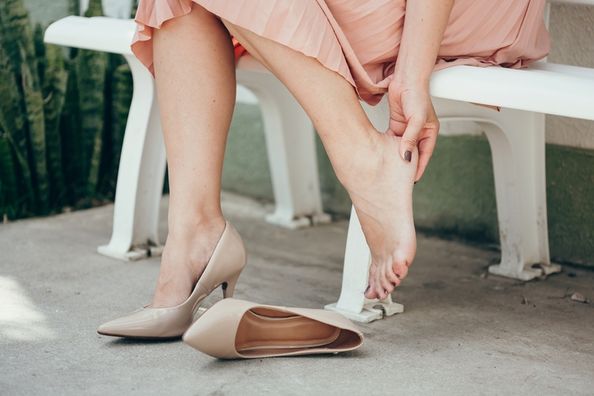Plantar fasciitis typically affects adults aged 40 – 60. It is most often caused by a combination of overuse and poor arch support. It results in injury of the plantar fascia in the heel area, leading to inflammation and pain. The plantar fascia is a thick band of tissue that lines the bottom of your foot; it is anchored to the base of the heel bone and attaches to ball of your foot.
If you are experiencing a mild pulling or tight sensation on the bottom of your heel that is worse when you go from sitting to standing, after exercising or when standing for long periods of time there are several treatment methods you can try at home.
Home remedies for relieving the pain of plantar fasciitis:
a. Gentle stretching in the morning and evening with simple and slow “point and flex” exercises, making sure to stop if pain results.
b. Arch support is important and adding an over the counter medication option is a fine initial method for treating the problem.
c. Make job-site modifications if you stand on your feet for long periods at work. Request a cushioned mat to stand on and choose footwear with supportive arches.
d. Work to maintain a healthy weight for your height, age and gender
e. Avoid flat shoes, flip flops or walking barefoot
f. Lower your impact level during exercise or switch to cross-training/biking
g. Ice the bottom of your feet gently with a frozen water bottle each evening for 10 – 15 minutes. Take care to not apply ice directly to skin.
h. Take over the counter pain relief medications if tolerated and as directed.
Ignoring plantar fasciitis and “suffering through the pain” will likely lead to a longer and more involved treatment plan. Compensating for your pain can lead to other musculoskeletal conditions. Therefore, if conservative home care is not relieving your heel pain it is important to seek an evaluation with a board-certified podiatrist. Your podiatrist will work with you to design an aggressive treatment plan that fits your individual needs and lifestyle.
Treatment options for plantar fasciitis under the care of a podiatrist:
Often, your podiatrist will recommend a combination of several treatment methods at one time. Because every patient’s lifestyle and daily activities vary, there are different treatment plans available that fit each individual’s needs. Your physician will work with you to understand your particular needs and activity level and will prescribe the most appropriate plan that will resolve the inflammation in your foot.
- X‑Rays may be obtained to rule out heel spurs or other structural conditions.
- Corticosteroid injections are typically the first course of action for rapid relief. These injections usually begin to alleviate pain within 24 hours.
- Arch support is key; generic or eventually custom orthotics may be fabricated if needed.
- Physical Therapy (your treatment combination may include exercises to increase foot flexibility, manual therapy, kinesiotape, ultrasound and electrical-stim).
- Custom orthotic inserts to correct structural problems in your foot anatomy
- Immobilization or casting techniques are rarely used but can provide relief in extreme cases.
- The need for surgery and other non-invasive techniques are not likely in most individuals, but may be necessary if conservative care fails.
- Night splints are over-the-counter devices that aid in stretching the foot and fascia while sleeping. These may be difficult for some patients to tolerate, but very helpful to other patients.
A podiatrist will also decide if there are any other conditions that may be contributing to your heel pain. For example, bone spurs, bursitis and Achilles tendinitis may present in a similar manner as plantar fasciitis. A thorough exam will identify and confirm the condition with which you are struggling.
Taking control of your foot pain and working with a physician is the best course of action, nonsurgical treatments typically can provide pain relief. Contact a member of the DuPage Medical Group Podiatry department at 630−510−6929 to begin planning your treatment today.
Health Topics:







